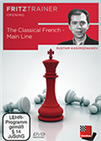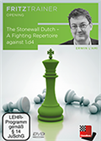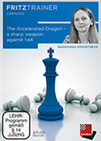Ukraine also on 9 out of 10
Since we last reported after round three, Russia rose through the ranks in the open section with wins over Turkey and Armenia. Ukraine, in the meantime, lost their perfect score by drawing with Armenia in round four, but immediately rejoined the leading group with an important victory over the English team.
Sharing third and fourth places are Slovenia and Germany. While Slovenia upset Georgia and defeated Switzerland in rounds four and five, Germany first beat Greece and then inflicted a second consecutive loss on the Dutch team. Both squads have challenging tasks on hold, as they will be facing Azerbaijan and Armenia after the rest day.
Wednesday's sixth round will also see the direct clash between co-leaders Russia and Ukraine.

Shakhriyar Mamedyarov and Arkadij Naiditsch from Azerbaijan | Photo: Official site

Rasmus Svane, Daniel Fridman and Liviu-Dieter Nisipeanu from Germany | Photo: Official site
Everything worked out well for Russia in round four, as co-leaders Armenia and Ukraine drew while England defeated the Netherlands, the only other team with a perfect score until round three. The Russian squad faced the 17th seeds from Turkey, who had a strong start but failed to offer resistance against the rating favourites, losing 3½:½ in a clearly lopsided match.
The all-important match-up between Ukraine and Armenia, two fairly recent Olympic gold medallists, saw draws on boards one and two, while both Hrant Melkumyan and Vladimir Onischuk got full points with White to keep the score tied. Onischuk got an edge against Haik Martirosyan after the latter wasted a key tempo on move 24:
 After 1.e4 e6 2.d4 d5 3. Nc3 Nf6 4. e5 Nfd7 5. f4 c5 6. Nf3 Nc6 7. Be3, the author takes a detailed look at a daring line with 7... cxd4 8. Nd4 Qb6, as well as the quieter plans with 7...cxd4 8. Nd4 Bc5, and the main line with 7... a6 and b5.
After 1.e4 e6 2.d4 d5 3. Nc3 Nf6 4. e5 Nfd7 5. f4 c5 6. Nf3 Nc6 7. Be3, the author takes a detailed look at a daring line with 7... cxd4 8. Nd4 Qb6, as well as the quieter plans with 7...cxd4 8. Nd4 Bc5, and the main line with 7... a6 and b5.
You can try your own variations on the diagram above
At this point, Black's best way forward was to exchange everything on f5 with 24...♞xf5 25.♘xf5 ♝xf5 26.♗xf5 ♜xf5, alleviating the pressure against his king. The Armenian instead chose 24...♛f6, giving White a chance to further activate his knights with 25.♘h5 ♛f7 26.♘eg3. Onischuk now had the initiative, a fact he accentuated by offering an exchange sacrifice with 26...♜g8 27.♖e5. From here on, the Ukrainian showed great technique until getting a 42-move win.
Armenia vs. Ukraine - Round 4
Ukraine lost their perfect score with that draw, but promptly restored their winning ways against England. The hero from round four, Vladimir Onischuk, lost against Gawain Jones — who later described this game as the first time he played proper chess in a while — but that was not enough for the Englishmen. Andrey Volokitin beat David Howell with White and Yuriy Kuzubov got the better of Luke McShane, who came from winning three in a row.
In a sharp position out of a Caro-Kann, McShane faltered on move 22. Later on, the fearless Londoner created a mess by pushing his g-pawn, but Kuzubov knew how to put a stop to the threats against his king:
 The Caro Kann is a very tricky opening. Black’s play is based on controlling and fighting for key light squares. It is a line which was very fashionable in late 90s and early 2000s due to the successes of greats like Karpov, Anand, Dreev etc. Recently due to strong engines lot of key developments have been made and some new lines have been introduced, while others have been refuted altogether. I have analyzed the new trends carefully and found some new ideas for Black.
The Caro Kann is a very tricky opening. Black’s play is based on controlling and fighting for key light squares. It is a line which was very fashionable in late 90s and early 2000s due to the successes of greats like Karpov, Anand, Dreev etc. Recently due to strong engines lot of key developments have been made and some new lines have been introduced, while others have been refuted altogether. I have analyzed the new trends carefully and found some new ideas for Black.
29...♜xe3 and now White does not even have the chance to give consecutive checks on h7 and c5. Resignation came two moves later.
Ukraine vs. England - Round 5

Ukrainians Vladimir Onischuk, Alexander Moiseenko and Yuriy Kuzubov | Photo: Official site
Meanwhile, Russia obtained a crucial 2½:1½ victory over Armenia. The only win was seen on board four, where Daniil Dubov defeated Arman Pakishian with the black pieces. Dubov has scored three wins and a single draw so far, and will most likely be in the line-up against Ukraine despite having arrived in Georgia as the reserve player — a clear illustration of Russia's strength; let us not forget that they did not take any of their four top rated representatives to Batumi, excluding retired former world champion Vladimir Kramnik.
Pakishian lost the thread on move 26, when he miscalculated a forcing line:
 In the Dutch Stonewall Black from the very first move fights for the initiative. Let Erwin l'Ami take you on a fascinating journey to the depth and attractions of this unique opening. At the end you will be rewarded with a new repertoire against 1.d4!
In the Dutch Stonewall Black from the very first move fights for the initiative. Let Erwin l'Ami take you on a fascinating journey to the depth and attractions of this unique opening. At the end you will be rewarded with a new repertoire against 1.d4!
White is already in trouble, but here it was imperative to play 26.g4, preventing Black from advancing the g-pawn himself. The Armenian opted for 26.♖e4, entering a losing variation — there followed 26...g4 27.♖xe7+ ♚h6 28.♖xd7 ♜xf3+ (the e-pawn is pinned) 29.♔g1 ♜xg3+. Dubov doubled his rooks on the second rank and won after 39 moves.
Russia was up in the score board, but they had to wait quite a while until their victory was confirmed, as Gabriel Sargissian missed a couple of chances to convert a slightly favourable queen endgame against Nikita Vitiugov.
Russia vs. Armenia - Round 5
Standings after Round 5 (top 10) - Open
| 1 |
8 |
|
Ukraine |
UKR |
5 |
4 |
1 |
0 |
9 |
73,0 |
12,5 |
| 2 |
1 |
|
Russia |
RUS |
5 |
4 |
1 |
0 |
9 |
66,0 |
13,5 |
| 3 |
19 |
|
Slovenia |
SLO |
5 |
4 |
0 |
1 |
8 |
54,0 |
13,5 |
| 4 |
9 |
|
Germany |
GER |
5 |
3 |
2 |
0 |
8 |
50,0 |
11,5 |
| 5 |
5 |
|
Armenia |
ARM |
5 |
3 |
1 |
1 |
7 |
73,5 |
12,5 |
| 6 |
4 |
|
Azerbaijan |
AZE |
5 |
3 |
1 |
1 |
7 |
55,0 |
12,0 |
| 7 |
2 |
|
England |
ENG |
5 |
3 |
1 |
1 |
7 |
52,5 |
12,5 |
| 8 |
15 |
|
Croatia |
CRO |
5 |
3 |
1 |
1 |
7 |
46,0 |
10,5 |
| 9 |
14 |
|
Georgia |
GEO |
5 |
2 |
2 |
1 |
6 |
54,0 |
12,0 |
| 10 |
7 |
|
Netherlands |
NED |
5 |
3 |
0 |
2 |
6 |
50,0 |
10,5 |
...40 teams
Games from Rounds 4 and 5
All games available at Live.Chessbase.com
Russia beat Georgia in the Women's
The only squad that still has a perfect score in Batumi is the Russian women's team. Led by Aleksandra Goryachkina, they defeated the second seeds from Georgia in round four and Hungary in round five. By now, the leaders and defending champions have used a straightforward strategy to decide their line-ups: to give Olga Girya the black pieces and Valentina Gunina the white pieces in all instances.
In the key match-up against Georgia, both Kateryna Lagno and Girya failed to convert favourable positions, but Gunina came to the rescue, beating Meri Arabidze on board four. The players exchanged queens early in the game, and the Russian gained a pawn on move 24. Later on, Gunina correctly transferred from a four-rook endgame to a simple rook ending with pawns on both flanks:
 After 1.e4 c5 2.Nf3 Nc6 3.d4 cxd4 4.Nxd4 g6! leads to the so-called "Accelerated Dragon Defense". On this DVD the Russian grandmaster and top women player Nadezhda Kosintseva reveals the secrets of her favourite opening.
After 1.e4 c5 2.Nf3 Nc6 3.d4 cxd4 4.Nxd4 g6! leads to the so-called "Accelerated Dragon Defense". On this DVD the Russian grandmaster and top women player Nadezhda Kosintseva reveals the secrets of her favourite opening.
A pair of rooks was swapped after 39.♖be4 and Gunina needed no fewer than 21 more moves to get the win.
Georgia vs. Russia - Round 4

Valentina Gunina | Photo: Official site
Georgia bounced back with a 2½:1½ victory over Armenia and are now sharing second place with Azerbaijan and Serbia. The Serbians upset the third seeds from Ukraine in round five and will try to take down the locals after the rest day.
Standings after Round 5 (top 10) - Open
| 1 |
1 |
|
Russia |
RUS |
5 |
5 |
0 |
0 |
10 |
76,0 |
14,5 |
| 2 |
2 |
|
Georgia |
GEO |
5 |
4 |
0 |
1 |
8 |
66,0 |
13,5 |
| 3 |
5 |
|
Azerbaijan |
AZE |
5 |
4 |
0 |
1 |
8 |
54,0 |
13,5 |
| 4 |
15 |
|
Serbia |
SRB |
5 |
4 |
0 |
1 |
8 |
48,5 |
14,5 |
| 5 |
4 |
|
Poland |
POL |
5 |
3 |
1 |
1 |
7 |
58,0 |
11,5 |
| 6 |
9 |
|
Georgia 2 |
GEO |
5 |
3 |
1 |
1 |
7 |
57,5 |
12,0 |
| 7 |
7 |
|
Hungary |
HUN |
5 |
3 |
1 |
1 |
7 |
55,0 |
10,5 |
| 8 |
11 |
|
Italy |
ITA |
5 |
3 |
0 |
2 |
6 |
50,0 |
11,0 |
| 9 |
13 |
|
Armenia |
ARM |
5 |
2 |
2 |
1 |
6 |
47,0 |
12,0 |
| 10 |
3 |
|
Ukraine |
UKR |
5 |
3 |
0 |
2 |
6 |
46,0 |
10,5 |
...32 teams
Games from Rounds 4 and 5
All games available at Live.Chessbase.com
Links
























